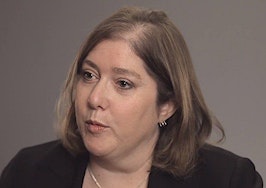Zillow CEO Spencer Rascoff talks about how the explosion in open data that’s available to tech companies will affect the real estate business.
Whether it’s info on schools and crime, mortgage data, zoning permits, smog, traffic, noise, flood data or weather, “If there’s data out there associated with the home, we want it,” says Zillow CEO Spencer Rascoff.
That doesn’t mean that Zillow will make public everything it gets its hands on — through public records, Zillow knows the names of homeowners and the amount of the mortgage they took out when they bought or refinanced their home, but doesn’t publish it.
But for the most part, “If (legislators have) decided that it should be made publicly available, I want it on Zillow,” Rascoff tells writer and editor Alexander Howard.
Howard interviewed Rascoff as part of an ongoing series hosted by the Congressional Internet Caucus Advisory Committee, a bipartisan group of more than 100 members of the House and Senate working to educate their colleagues about the promise and potential of the Internet.
While the company has so far “found it tacky, for lack of a better word, to put on a single property’s page what the mortgage amount was at the time of origination,” it’s conceivable that Zillow will someday publish the owner’s name — the site already provides “deep links” to county assessor records that disclose that information in some markets, like King County, Wash.
When Zillow launched seven years ago “it was sort of pre-Facebook, pre-Twitter, pre-NSA scandals … and there was a higher expectation of personal privacy back then,” Rascoff says. Since then “our whole society has shifted … to much more open and transparent sharing.”
“When we had the discussion seven years ago around names, whether we should include it at launch, there was no debate in the room — ‘Of course not, we absolutely shouldn’t (publish) the name of the property owner.’ We have this discussion every year … and every year (some argue) maybe we should, you know you can get that data anyway from county records … our position has gotten softer. We still haven’t done it, but I do suspect at some point we’ll cross that line.”
When it comes to surfacing data that’s useful to buyers, Rascoff says Zillow is likely to come down in favor of greater transparency, even in cases where sellers might be sensitive about the nature of the information being disclosed.
Rascoff said he’s “absolutely” in favor of identifying homes whose owners have licensed drilling rights to allow “fracking,” for example. When it come to publishing the addresses of nearby sex offenders, he said Zillow “probably ought to; we probably will at some point.”
Even data that seemingly have little to do with real estate — political campaign contributions are tracked by address, for example — is fair game.
“That’s something that the legislators have decided should be publicly available, I don’t think it presents a public safety issue,” Rascoff says of publishing political campaign contributions associated with an address. “Is it relevant to my decision to move into this neighborhood, or buy this home? Kind of debatable … it’s not like (foreclosure data) where its advancing my ability to make an informed decision about this real estate transaction.
“It’s interesting from a voyeuristic standpoint, I think to a Zillow user, but it’s not necessarily making the real estate market more efficient.”
As more and more information becomes available, it can be challenging to get it all on the site, Rascoff says. Howard noted that the FCC has made information on broadband rates available throughout the country.
“I’ve got a whole list now of things we’ve got to go back and build,” Rascoff says at the end of the interview. “This is the challenge for a technology company like Zillow, is these are the types of ideas that end up kind of below the cut line when you sit in prioritization meetings about what you work on over the next three months. No one of them really moves the needle in a big way, but in the aggregate, they make a Web service like Zillow much more useful.”
“What I’d love to do is develop more ways where we can eat our own cooking, and we can allow others to integrate on top of Zillow,” Rascoff says, citing weather data as an example. “We haven’t gotten to it yet. But why should we be the ones to get to it? Why can’t somebody else mashup Zillow and this weather data? Here it gets complicated and sort of interesting (you have) business model questions” that come into play.
Of Zillow’s complicated and interesting relations with multiple listing services, Rascoff says, “Anyone whose business model is predicated on the assumption that their secret data will remain secret and proprietary, that’s not a sustainable business model. This data will inevitably be free.”
But Rascoff doesn’t think MLSs are in trouble, because “they are basically local associations that advocate on behalf of their member interests and adjudicate disputes. It’s quite different from the companies that sell us property record data, for example, who I do think are going to have a challenge to their busines model in the future.”
Rascoff, whose wife is a pediatrician, compared Zillow to online providers of medical information, like WebMD or Yahoo! Health, and the National Association of Realtors to the American Medical Association.
“Hospitals and doctors … are sort of like brokers and Realtors, and they don’t compete with WebMD,” he says. “What has happened, though, is who is a successful doctor in this day and age is changing quite rapidly, because of the Internet.”
Rascoff said his wife uses WebMD before seeing her patients because she knows their parents will be doing research in the same way that real estate agents and brokers know that their clients are likely to have visited Zillow before contacting them.







